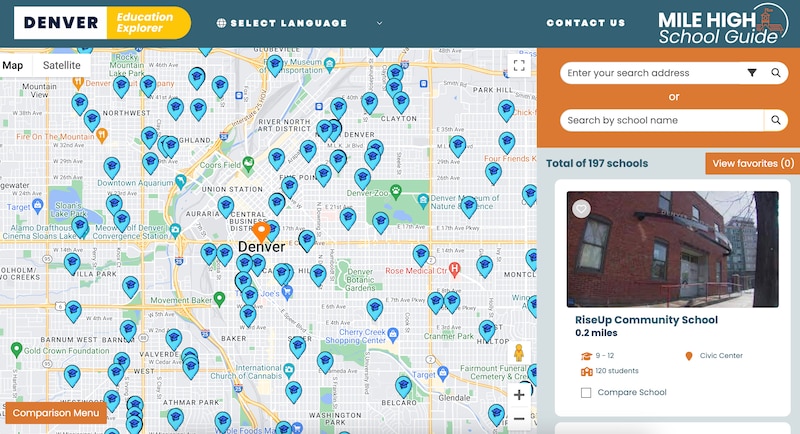Sign up for Chalkbeat Colorado’s free daily newsletter to get the latest reporting from us, plus curated news from other Colorado outlets, delivered to your inbox.
It’s been three and a half years since a committee recommended that Denver Public Schools develop a dashboard of data about its schools. The district has not done so — but an advocacy organization launched its own dashboard this week.
The Mile High School Guide allows families to look up information about all 197 of Denver’s public schools. The information includes teacher-to-student ratios, standardized test scores, student attendance rates and discipline data, whether the school requires uniforms or offers preschool classes or after-school child care, and more.
“We just saw a gap in this information,” said Pat Donovan, the managing partner at RootED, the Denver-based group behind the website. He said that as time went on and DPS did not debut a dashboard of its own, RootED felt it “had a moral imperative to be responsive to the community: ‘We have the ability to do this, so we should.’ So we did.”
The information in the dashboard came from the Colorado Department of Education and from DPS itself, Donovan said, adding that the district was cooperative throughout the process. Some of the data is already accessible on school, district, and state websites, but much of it is hard to find or not publicly available without submitting an open records request.
The dashboard’s launch coincides with DPS’ school choice window, during which families can apply to send their children to any school in the district next year. The school choice window opened Jan. 11. Families have until Feb. 12 to submit their applications.
In addition to English, the Mile High School Guide is available in eight languages, including Spanish and Arabic, the second- and third-most common languages among DPS families.
Parent Yaeel Duarte worked with RootED to gather input for the dashboard from Spanish-speaking families at schools, churches, and food banks across the city.
A mother of four whose youngest child is an 11th grader at Girls Athletic Leadership Academy charter school, Duarte said she believes the dashboard is important because it shows parents they have choices for where to send their children to school — especially if their current school isn’t a good fit, as Duarte experienced with one of her children.
“I want them to know that there are options out there,” Duarte said in an interview.

The idea of a data dashboard has been controversial. It first came up in the spring of 2020, when a 30-member community committee recommended it. The committee was commissioned by DPS and tasked with “reimagining” the district’s color-coded school rating system, which many educators and parents found frustrating and unhelpful.
The committee recommended scrapping DPS’ rating system and using the state’s rating system instead — which the district did. But since the state ratings are based almost entirely on standardized test scores, the committee suggested DPS launch a separate data dashboard with information that would give parents “a more accurate picture of each school.”
The committee suggested the dashboard could include information like average class sizes, the reliability of a school’s buses, and the ratio of mental health staff to students.
In November 2022, more than two years after the initial recommendation, DPS asked for family members, students, teachers, and others to apply to serve on a new committee to develop the dashboard. The committee was supposed to start meeting in February 2023 and wrap up its work this June, with the dashboard set to go live this fall.
But the committee still hasn’t gotten started. DPS spokesperson Scott Pribble said the district is waiting on direction from school board members, some of whom have been wary about how the district and community would use the data in a dashboard.
Member Michelle Quattlebaum said at a 2022 board meeting that she worried the data would be used punitively against schools. Former member Auon’tai Anderson wondered how a dashboard would help students and whether DPS should invest resources in developing one.
Former board member Scott Baldermann was one of the most vocal critics.
“What I’m worried about is how parents could weaponize this data,” Baldermann said in 2020.
Baldermann was also critical of school choice and what he saw as the competition it creates between schools. RootED, the organization behind the new Mile High School Guide, supports school choice and charter schools, as do its funders such as The City Fund.
But Donovan said the organization isn’t solely focused on those issues and has backed a variety of projects, including a training film for teachers on how to support LGBTQ+ students. He noted that the guide doesn’t even label schools as district-run or charter.
“Parents don’t care about that,” Donovan said. “They’re not like, ‘My primary consideration is whether it’s a charter or not.’ They want a good school.
“This is the type of information they would like to see.”
In addition to the Mile High School Guide, RootED launched a separate data dashboard aimed at policymakers, advocates, and journalists. Called Denver School Insights, it includes district-level data — rather than school-level data — broken down by neighborhood, as well as by school board, city council, and state legislative districts.
Melanie Asmar is the bureau chief for Chalkbeat Colorado. Contact Melanie at masmar@chalkbeat.org.







